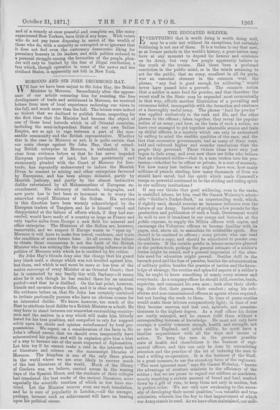MOROCCO AND SIR JOIIN DRUMMOND IIAY.
WE fear we have been unjust to Sir John Hay, the British Minister in Morocco. Immediately after the appear- ance of our article censuring him for resisting the free development of trade and settlement in Morocco, we received letters from men of local experience endorsing our views to the full, and much more than the full. The letters were indeed so violent that we declined to publish them, suspecting for the first time that the Minister had become the object of one of those local hatreds which in all Oriental countries, including the semi-independent States of our own Indian Empire, are so apt to rage between a part of the mer- cantile community and the British representative. Whether this is the case in Morocco or not., it is quite certain that our main charge against Sir John Hay, that of retard- ing British enterprise in Morocco, is unfounded. It is clear from evidence before us that he has never impeded European purchases of land, but has persistently and strenuously pleaded with the Court of Morocco for free- trade, has repeatedly endeavoured to induce the Moorish Divan to consent to mining and other enterprises favoured by Europeans, and has been always defeated, partly by Moorish jealousy, and partly by the almost instinctive dislike entertained by all Mohammedans of European en- croachment. His advocacy of railroads, telegraphs, and new ports has in fact been so incessant as to weary the somewhat stupid Ministers of the Sultan. His services in this direction have been warmly acknowledged by the European traders of Tangiers, and ho is himself vexed and disappointed at the failure of efforts which, if they had suc- ceeded, would have made of a country as large as France and only twelve miles from Europe a new field for mineral and other enterprise. The Ministers of the Sultan are, however, immovable, and we suspect if Europe wants to " open up " Morocco it will have to make free travel, residence, and trade the condition of some future loan. At all events, the failure to obtain those concessions is not the fault of the British Minister who has nothing like the commanding influence in the politics of Morocco with which he is credited by his critics. Sir John Hay's friends deny also the charge that his guard levy black mail, a charge which was not levelled against him, but them, and which is and must be more or less true of the native entourage of every Minister at an Oriental Court ; that he is connected by any family ties with Barbary—it seems clear he is not, though he has resided there for an unusual period—and that he is disliked. On the last point, however, friends and enemies always differ, and it is clear enough, from the evidence before us, that Sir John has certainly contrived to irritate profoundly persons who have no obvious reason for an interested dislike. We know, however, too much of the East to attribute local dislike to a British Minister as a fault. He may have to stand between our somewhat encroaching country- men and the natives in a way which will make him bitterly hated for his best qualities, and compelled to rely for support solely upon his chiefs and opinion uninfluenced by local pre- possessions. We regret, on a consideration of the facts in Sir John's official career, that we should even temporarily have misconceived his policy, and will in expiation give him a hint of a way to become one of the most respected of diplomatists. Let him try if he cannot make a raid in the interests both of literature and science on the manuscript libraries of Morocco. The kingdom is one of the only three places in the world where we are ever likely to recover much of the lost literature of the world. Much of the library of Cordova was, we believe, carried across in the waning days of the Spanish Moors, and the students of their colleges had translated the best works of the ancient literature, more especially the scientific treatises of which so few have sur- vived. Let the Minister recover oven one such translation, and he is sure of popularity in London,—all the stronger, perhaps, because such an achievement will have no bearing upon his political career.


































 Previous page
Previous page